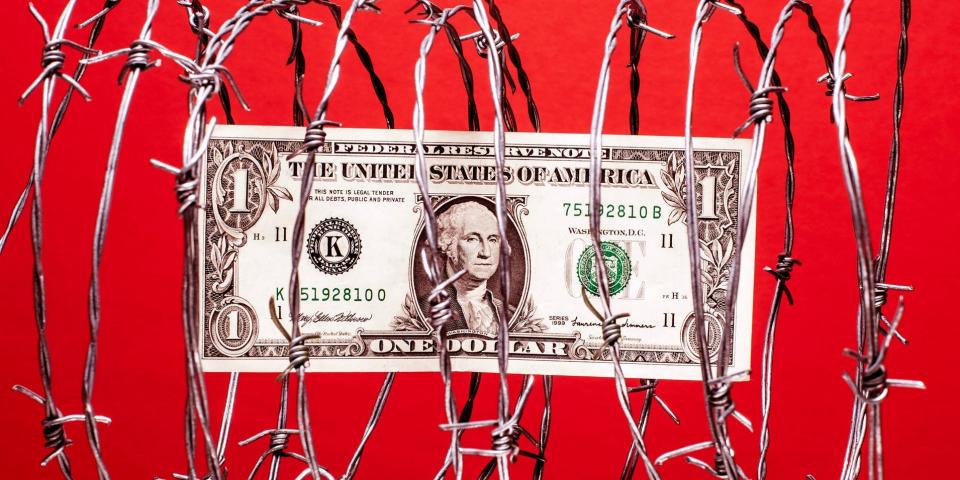3 reasons the dollar can't be dethroned as the world's dominant currency, according to Morgan Stanley

De-dollarization efforts won't do much to dethrone the dollar, Morgan Stanley said.
There are no true alternatives to holding the US dollar at the moment, Morgan Stanley strategists said.
The bank pointed to three reasons why de-dollarization fears are overblown.
The dollar's status as the top currency of central banks and for international trade probably isn't fading soon, according to Morgan Stanley.
The investment bank pointed to fears that the US dollar could eventually be dethroned as the world's top-held and most widely used currency. Rivals like the Chinese yuan or the Japanese yen or even a shared BRICS currency could disrupt the dollar's stats, some commentators have warned, but there are key reasons dollar dominance isn't going away anytime soon, Morgan Stanley strategists said.
"Which currency would you want to own when global stock markets start to fall, and the global economy tends to head into recession? You want to be positioning in US dollars because that has historically been the exchange rate reaction to those kinds of events." James Lord, the bank's head of FX strategy for emerging markets, said in a podcast last week.
"Bottom line, King dollar doesn't really have any challengers," Michael Zezas, the firm's head of US public policy research, added.
The firm pointed to three factors that will keep the dollar's top-dog status in financial markets:
1. The yuan isn't liquid enough to challenge the dollar
China's yuan, which officials in Beijing have been trying to position as a challenger to the dollar on the world stage, isn't liquid enough to truly disrupt the dominance of the greenback, the strategists said. That's partly due to strict capital controls China has on its currency, which limit the amount of cash that can be taken in and out of the country.
"It seems unlikely to challenge the US dollar meaningfully anytime soon. To do so, we think China would need to relax control of its currency and open the capital account. It doesn't seem likely that Beijing will want to do this anytime soon," Lord said.
Questions also linger over China's economy, given sagging consumer demand and the nation's ongoing property crisis.
"China may make some progress in denominating more of its bilateral trade in US dollars, but the impact that that has on global metrics of currency dominance is likely to be incremental," Lord added.
2. Concerns over the US debt won't affect the dollar.
Dollar doomsayers say trust is waning in the greenback as concerns mount over the US's rising debt balance. As of this year, the government has racked up over $34 trillion in debt, a record amount.
Yet, that has little impact on trust in the US dollar, given the currency's long-running reputation as a highly liquid safe- haven asset.
"I understand the concern, but for the foreseeable future, there's not much to it, " Zezas said. "Depending on the election outcome in the US, there's some fiscal expansion on the table, but it's not egregious in our view, and unless we think the Fed can't fight inflation — and our economists definitely think they can — then it's hard to see a channel toward the dollar becoming an unstable currency."
Inflation has cooled dramatically from its highs since 2022, despite pandemic-era spending and mounting debt levels. Consumer prices grew just 3.5% year-per-year in March, according to the latest inflation report, down from a peak of 9.1% several years ago.
3. Crypto isn't a viable alternative
While cryptocurrencies like bitcoin are liquid, they're too volatile to be considered a true alternative to the dollar, strategists said.
"If I'm holding a crypto coin that rises, say, 10% a month, I'm less likely to use that for trade and instead just hoard it in my wallet to benefit from its price appreciation," David Adams, Morgan Stanley's head of G10 FX strategy. "Now, reasonable people can disagree about whether cryptocurrencies are going to appreciate or depreciate, but I'd argue that the best outcome for a dominant currency is neither."
Other economic experts have also brushed off the possibility of the dollar being toppled from its dominant status anytime soon. Displacing a dominant currency is something that happens over the course of decades, economists previously told Business Insider, as it takes time for people to shift to other currencies once a dominant currency is recognized as "safe."
Read the original article on Business Insider
